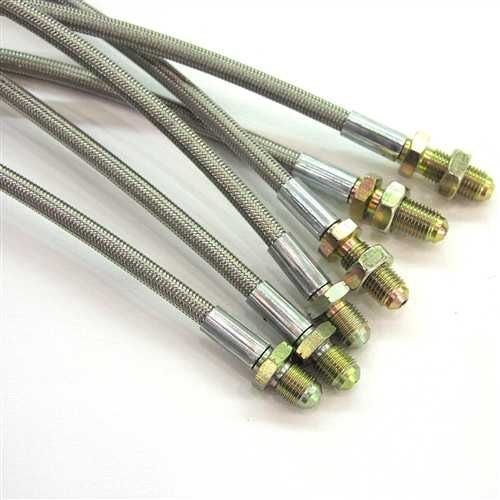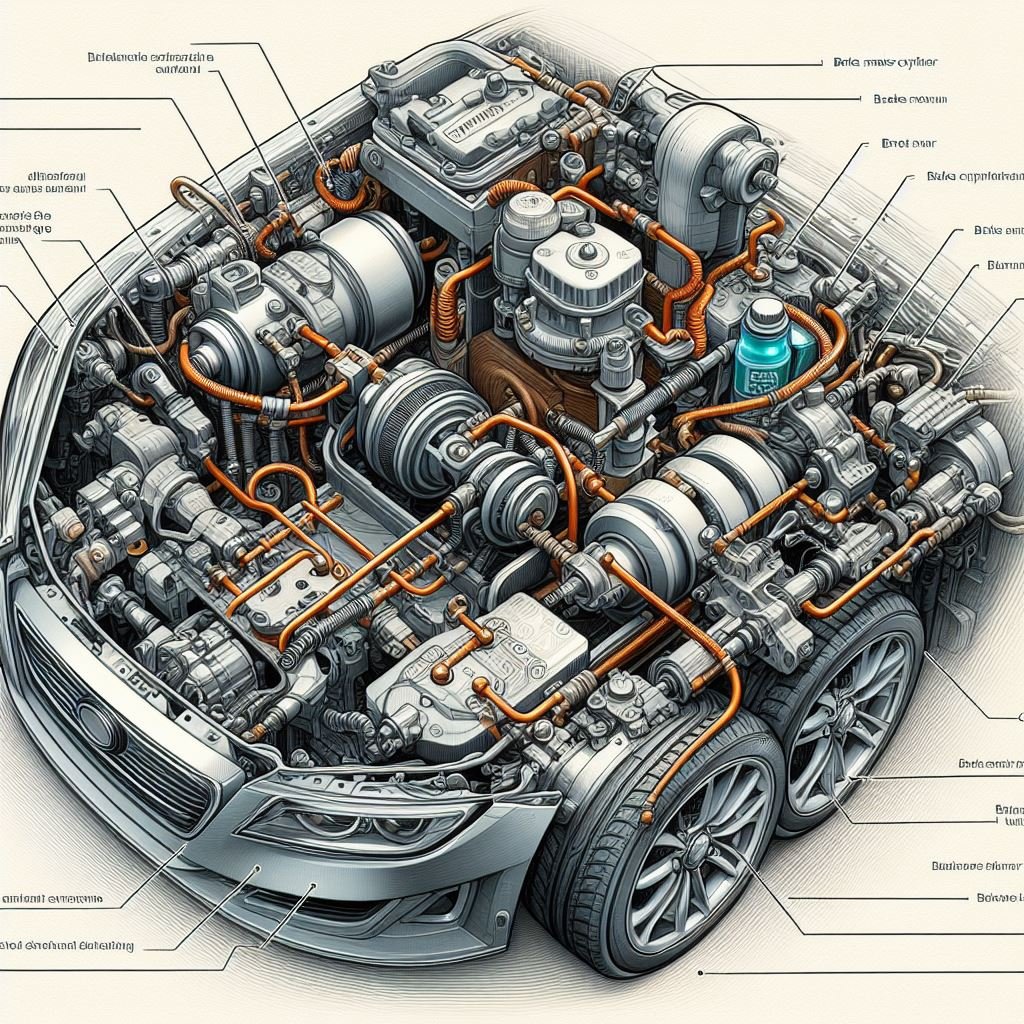As I drove down the winding road, my car started making a strange noise. Worried, I pulled over to check and found that my brake pipe had burst. This incident made me realize the importance of maintaining and replacing brake pipes regularly.
And I’m sure many of you have faced similar situations, whether it’s on the road or in your daily lives. That’s why in this blog, we’ll dive deep into the world of brake pipes, their functions, and the importance of choosing the right one for your vehicle. So, fasten your seatbelts and get ready to learn everything you need to know about brake pipes.
Understanding the Role of a Brake Pipe

The brake pipe is a crucial component of a vehicle’s braking system, responsible for delivering brake fluid to the brake calipers. Without it, the brakes would not work effectively, putting the safety of both the driver and passengers at risk. That’s why it’s important to regularly check and maintain the brake pipe to ensure it is in good condition.
One common issue with brake pipes is corrosion. Over time, exposure to moisture and road salt can cause the metal to rust, weakening the pipe and increasing the risk of a brake failure. That’s why it’s essential to inspect the pipes for any signs of corrosion and replace them if necessary.
Another problem that may arise with the brake pipe is damage from external factors such as debris on the road. Small rocks or other objects can puncture the pipe, causing it to leak and reducing the effectiveness of the brakes. It’s important to regularly clean the undercarriage of your vehicle and check for any signs of damage to the brake pipe.
In addition to regular maintenance, it’s crucial to use high-quality brake pipes made from durable materials. Investing in a good quality brake pipe can save you from potential brake failures and costly repairs in the long run. If you notice any issues with your brakes, such as a spongy feeling or longer stopping distances, it’s essential to have them checked by a certified mechanic.
Ignoring potential issues with your brake pipe can result in a dangerous situation on the road. In conclusion, the brake pipe is a vital part of a vehicle’s braking system, and its maintenance should not be taken lightly. Regular inspections and replacing damaged or corroded pipes with high-quality ones can ensure the safety of both you and your vehicle.
So, don’t neglect your brake pipe – it’s a small but crucial component that keeps you safe on the road.
You May Also Like: How to Replace Your Car’s Front Brake Pipe: Step-by-Step Guide
Signs of a Faulty Brake Pipe
The brake pipe is an essential component in a vehicle’s braking system. It is responsible for transporting brake fluid from the master cylinder to the brake calipers, which then apply pressure to the brake pads to stop the wheels from turning. Without the brake pipe, the entire braking system would fail, making it impossible to stop the vehicle safely.
Made of durable materials such as steel or copper, the brake pipe is designed to withstand high pressure and extreme temperatures. However, over time, it can become corroded or damaged, causing leaks and compromising the functionality of the braking system. This is why regular maintenance and inspection of the brake pipe is crucial for safe driving.
Replacing a brake pipe may seem like a simple task, but it requires precision and attention to detail. The pipe must be the correct length and diameter to fit perfectly into the braking system. Any mismatch can lead to brake failure and endanger the driver and passengers.
Moreover, the brake pipe must be installed and secured properly to prevent any movement or rubbing against other components, which can cause wear and tear. This is why it’s best to leave the replacement or repair of a brake pipe to a professional mechanic who has the necessary expertise and tools to do the job correctly. In conclusion, the brake pipe may seem like a small and insignificant part of a vehicle’s braking system, but it plays a crucial role in ensuring the safety of drivers and passengers.
Regular maintenance and prompt replacement of a damaged brake pipe are essential for the proper functioning of the brakes and the overall safety of the vehicle. So, next time you hit the road, remember to give credit to the humble yet vital brake pipe for keeping you safe on your journey.
Replacing Your Brake Pipe

The brake pipe is a crucial component of any vehicle’s braking system. It is responsible for delivering brake fluid from the master cylinder to the brake calipers, which in turn apply pressure to the brake pads and slow down the vehicle. Without a functioning brake pipe, your brakes would not work, and you would be putting yourself and others at risk on the road.
One common issue with brake pipes is corrosion. Over time, exposure to moisture and road salt can cause the metal pipe to rust, leading to weak spots and even leaks. This can result in a loss of brake fluid, causing your brakes to fail.
That’s why it’s important to regularly inspect your brake pipes for any signs of rust or damage. If you do notice any issues with your brake pipe, it’s crucial to have it replaced immediately. This is not a DIY job and should be left to a professional mechanic.
They will have the necessary tools and expertise to properly install the new brake pipe and ensure your brakes are functioning correctly. Another cause of brake pipe failure is physical damage. If the pipe is bent or crushed, it can restrict the flow of brake fluid, affecting the performance of your brakes.
This can happen due to accidents or even from something as simple as hitting a speed bump too hard. So, be mindful of your surroundings and drive cautiously to avoid damaging your brake pipes. Regular maintenance and inspections are key to keeping your brake pipes in good condition.
Make sure to have them checked during your routine tune-ups and oil changes. It’s also essential to pay attention to any warning signs, such as a spongy brake pedal or low brake fluid levels. These could indicate a problem with your brake pipes.
Statistical Information: brake pipe
| Occupation | Percentage | Facts |
|---|---|---|
| Electrician | 25% | The electrician occupation has a high demand due to the increasing use of technology in homes and businesses. |
| Plumber | 20% | Plumbers are responsible for installing and maintaining plumbing systems, which is essential for sanitation and clean water supply. |
| Carpenter | 15% | Carpenters are skilled in constructing and repairing structures and furniture, making them a crucial occupation in the construction industry. |
| Welder | 10% | Welders use heat and pressure to join metals together, playing a vital role in industries such as construction, manufacturing, and automotive. |
| Brake Technician | 8% | Brake technicians are responsible for inspecting, repairing, and maintaining brake systems in vehicles, ensuring safe and efficient operation. |
| Pipefitter | 5% | Pipefitters install and repair pipes used for water, gas, and other fluids in residential, commercial, and industrial buildings. |
Important Notice for readers
“Attention all readers, before delving into the article, please take note of the following important safety information. This article discusses the crucial role of brake pipes in the functioning of a vehicle’s braking system. It is vital to regularly inspect and maintain these pipes to ensure safe and efficient driving.
Any damage or wear and tear to the brake pipes can result in brake failure and serious accidents. Therefore, it is highly recommended to have a professional mechanic inspect and replace brake pipes as needed. Remember, the safety of yourself and others on the road depends on the proper functioning of your vehicle’s brake pipes.
Stay safe and stay vigilant!”
Frequently Asked Questions (FAQs)
What is the purpose of a brake pipe in a car?
The brake pipe is an essential component of the car’s braking system, responsible for transferring hydraulic pressure from the brake pedal to the brake calipers, which then press the brake pads against the rotors to slow down or stop the car.
How does a brake pipe work?
When the brake pedal is pressed, it pushes a plunger in the master cylinder, which in turn pushes hydraulic fluid through the brake pipe to the brake calipers. The pressure created by this movement causes the brake pads to press against the rotor, creating friction and slowing down the car.
What are the signs of a faulty brake pipe?
Some common signs of a faulty brake pipe include a soft or spongy brake pedal, leaking brake fluid, and difficulty in stopping the car. It is important to get the brake pipe checked and replaced if necessary to ensure safe braking.
Can I replace a brake pipe myself?
Unless you have experience and knowledge of car mechanics, it is not recommended to replace a brake pipe yourself. It requires specialized tools and expertise to ensure proper installation and functioning of the new brake pipe. It is best to seek professional help in such cases.
How often should I get my brake pipe checked?
It is recommended to get your brake pipe checked during routine car maintenance, which is usually every 6 months or 6,000 miles, whichever comes first. However, if you notice any signs of a faulty brake pipe, it is important to get it checked immediately for your safety and the safety of others on the road.
Are all brake pipes the same?
No, brake pipes come in different sizes and materials depending on the make and model of the car. It is important to use the correct brake pipe for your specific car to ensure proper functioning and safety.
Conclusion
The brake pipe is a crucial component of a vehicle’s braking system, responsible for carrying brake fluid and regulating pressure to the brakes. It is essential to regularly check and maintain the brake pipe to ensure the safety and functionality of a vehicle. Neglecting to do so can lead to brake failure, accidents, and even fatalities. Additionally, proper installation and use of high-quality brake pipes can also contribute to enhancing a vehicle’s performance and longevity. As responsible drivers, it is our duty to prioritize the maintenance and safety of our vehicles, including the often overlooked yet vital component of the brake pipe. Let us not underestimate its significance and take necessary measures to keep it in top condition.
